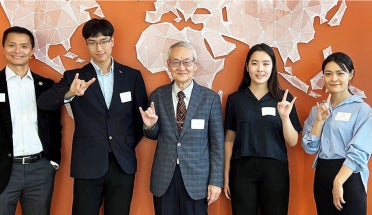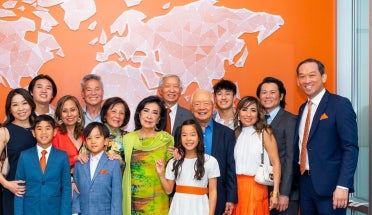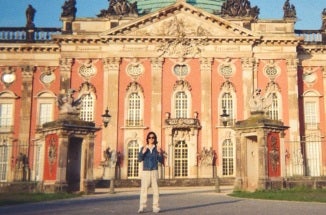
Global Career Launch Connects Students to AI Research in Germany
- Aug 25, 2023
- Global Engagement and Strategy
- by Alex Briseño
For senior anthropology and government double major Joe Eduard Rucker, an interest in government and emerging technologies compelled him to work at the Global Disinformation Lab (GDIL), which encourages collaborative interdisciplinary research on the global circulation of misinformation and disinformation.
What Rucker didn’t expect, though, was for the job to present an opportunity through the Global Career Launch (GCL) program to study, research and work in the field of artificial intelligence in Germany. Created in 2020, GCL is an innovative global internship framework for faculty to lead undergraduate and graduate students in high-impact work and research experiences abroad.
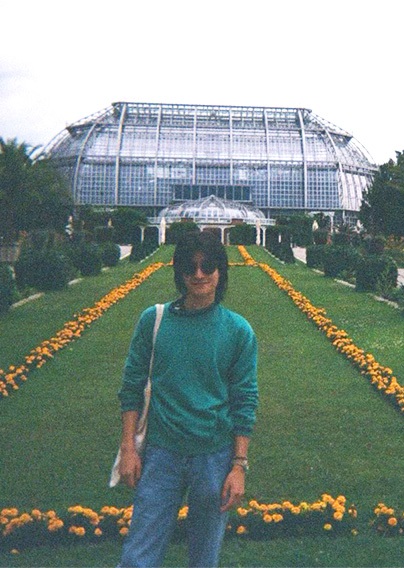
Established at The University of Texas at Austin in 2020, the GDIL is led by Professor Michael Mosser, who is also leading the GCL project “Empowering Students to Succeed in the 21st-Century Global Digital Environment.”
Through their tandem work at the GDIL, Mosser knew Rucker was the perfect candidate for the project to be conducted in Frankfurt (Oder), a small rural town along the Oder River that separates Germany and Poland, roughly 60 miles east of Berlin.
“I didn’t know if I would ever get another opportunity at this again, so I decided I might as well go for it,” Rucker said. “It’s right up my research interest, and I’ve never been to Germany before, so it sounded perfect for me.”
Mosser’s GCL course also served as his vehicle to re-establish ties with a former partner institution, University of Viadrina in Frankfurt (Oder). Mosser specifically collaborated with Jürgen Neyer, the founding director of the European New School of Digital Studies, a cross-border, international teaching and research institution uniting University of Viadrina and Adam Mickiewicz University in Poland.
“I want this to be a study abroad-plus kind of experience,” Mosser said. “A traditional study abroad experience has the academic and cultural sides, and the GCL has that third work or internship side of things. I want students to get a sense of what it feels like to actually work in another country on something that has real-world implications.”
Intercultural Collaboration
Coincidentally, Rucker arrived in Germany right as ChatGPT gained traction around the world.
Aside from reinvigorating a former partnership and connecting UT Austin students with unique opportunities, this particular GCL course is additionally tasked with researching what Mosser views as one of the big questions of the 2020s: How can we access responsibly sourced and accurate information, communication and speech in an era when disinformation floods the internet?
As the visionary for the European New School’s side of the partnership, Neyer has worked in and researched artificial intelligence for more than five years.
“Jürgen was looking at the ethics of AI before ChatGPT came out,” Mosser said. “He was looking at the legal, moral and ethical implications of technology more than five years ago, even before that. He was looking at how information is transmitted in open societies and how we can use information in open societies to combat authoritarianism.”
Now that Rucker is in Germany, he not only gets to work alongside experts like Neyer, but he is also picking up on the European approach to information and emerging technologies like AI.
“This is an intercultural dialogue on artificial intelligence,” Neyer said. “He’s learning the European approach, and we’re learning the American way. I think especially when we talk about artificial intelligence, it’s very important that we learn to understand all sides of the dialogue: How can we approach this thing? What are the dos and don’ts, the strengths and weaknesses, and what are the benefits of the different approaches?”
Expanding Perspectives
In addition to Rucker’s research internship, he is taking courses on media and democracy with a focus on digital media; gender and politics in the digital age, which looks at how the implementation of social media has affected the feminist movement; human language in the digital era, which studies how people interact with AI technologies; and a politics of sovereignty course taught by Neyer, which Rucker describes as an international relations course implemented with AI technologies.
For the latter course, “students are expected to write as much as possible with different AI tools, and then to reflect on the experience and on the methodological strengths and weaknesses of different AI tools,” Neyer said. “[Rucker is] extremely helpful in that he's just so knowledgeable. He's very ambitious, he's curious and he’s interested in what we do there. I try to give him as much insight as possible into the natural language processing that we're doing during the training process of the AI It’s been really nice working with him.”
Aside from gaining valuable insight, such as what goes into the creation of AI, Rucker and his colleagues are also benefiting from the cultural exchange that comes with learning different philosophies and approaches to work habits, higher education and, more broadly, life in general.
“It’s a win-win for both sides,” Neyer said.
Cultural Exchange
In addition to his course load and timely research internship with Neyer, this GCL opportunity is also allowing Rucker to simultaneously expand his worldview by immersing himself in the region.
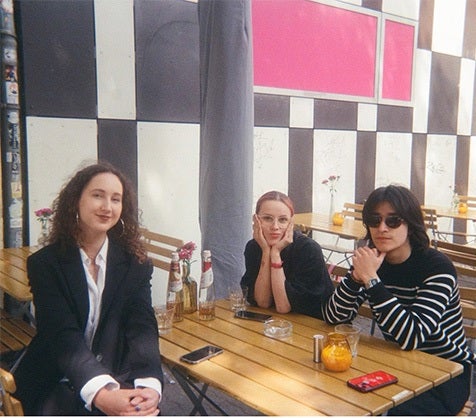
“Being on the eastern side of Germany, a lot of my friends here are Ukrainian,” Rucker said. “In the U.S., news about the war isn’t necessarily gone, but it’s not leading the evening news every single day anymore. I get updates from my Ukrainian friends just about every day. It opens your perspective on things. Talking with people outside of your culture is one of those life-changing things that I strongly recommend.”
Rucker finds himself enjoying both the slower pace of his small host town and its close proximity to major cities, such as Berlin, which is just a one-hour train ride away.
“If you want more of a trip, it’s only four or five hours to any other major city in Germany,” Rucker said. “We also branch outside of Germany, too. Last week, we went to Warsaw and explored the Polish side of things. In two weeks, my friends and I are planning on traveling to Amsterdam by train. It’s really cheap to travel, all things considered. It’s not expensive at all. Both ways cost a total of around 100 euros. That’s another huge upside: Traveling is affordable and fun.”
Having traveled to Japan and many other East Asian countries, including his parents’ home country of the Philippines, Rucker knew experiencing other cultures was pivotal in expanding his worldview. That’s why he’s especially grateful for this cultural exchange on and off campus during his first opportunity to spend an extended period of time in East Europe.
“Even understanding the difference between Eastern and Western Europeans has been interesting,” Rucker said. “It’s a fascinating mix of people. I’m meeting people from Turkey here, too. I’m very appreciative of getting to speak with people who are from places and regions of the world that I am not normally in contact with.”
He added, “Another funny thing is, being from Texas, it’s also very much a cultural exchange for them. I’m learning from them, but they’re also learning from me, in a way. It has been a lovely experience. I love it.”

